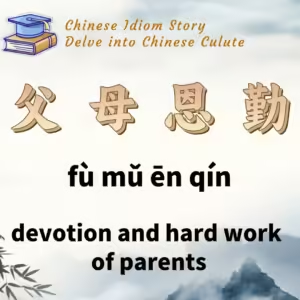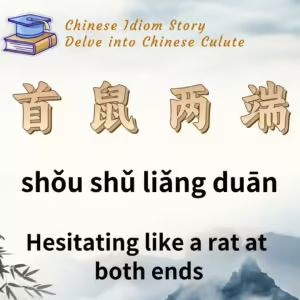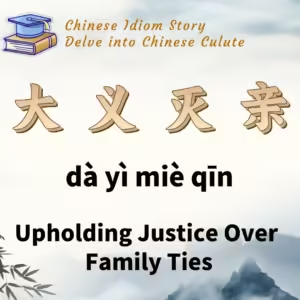
Chinese Idiom: 父母恩勤 (Mu Fu En Qin)
English Translation: The devotion and hard work of parents
pīn yīn: fù mǔ ēn qín
Idiom Meaning: Refers to the care and effort that parents put into raising their children, emphasizing the sacrifices and dedication involved.
Historical Source: he Book of Songs (《诗经·豳风·鸱鸮》)
Idiom Story
After the death of King Wu of the Zhou Dynasty, his young son, King Cheng, succeeded him with the assistance of his uncle, Duke of Zhou (Ji Dan). However, King Cheng’s other uncles, Guan Shu Xian and Cai Shu Du, were discontent and secretly allied with Wu Geng, the son of the defeated Shang King. They launched a rebellion against the Zhou.
Duke of Zhou led military campaigns to suppress the rebellion, which lasted several years. Upon his return, Duke of Zhou sent a copy of the poem Chixiao (《鸱鸮》) from the Book of Songs to King Cheng as a reminder of the sacrifices made.
The poem Chixiao uses personification to tell the story of a mother bird who laments the hardship of raising her young. It consists of four sections:
- The mother bird warns the predatory owl not to destroy her nest after taking her young.
- She prepares her nest to withstand future calamities.
- She describes the exhausting labor involved in building the nest.
- She expresses her ongoing worry over the incomplete nest.
The key lines are: “鸱鸮鸱鸮,既取我子,无毁我室。恩斯勤斯,鬻子之闵斯!”
Translated, it means: “O owl, o owl! You have already taken my chicks, do not destroy my nest. I have worked tirelessly to raise my young, leaving me exhausted.”
These lines illustrate the mother’s distress and hard work. Over time, the phrase “恩斯勤斯,鬻子之闵斯” has evolved into the idiom “父母恩勤,” symbolizing the selfless and diligent efforts of parents in nurturing their children.






